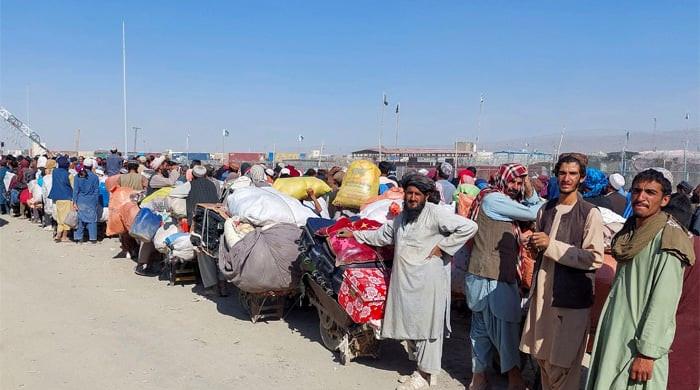Over 100,000 Afghans Depart Pakistan Amid Permit Cancellations
In the wake of the government’s declaration regarding widespread revocation of residency authorizations, over 100,000 Afghan individuals have exited Pakistan in the last three weeks, as stated by the interior ministry on Tuesday.
Islamabad initiated its extensive expulsion campaign on April 1.
Commentators suggest that these removals aim to exert influence on Afghanistan’s Taliban leadership, whom Islamabad holds responsible for escalating cross-border incursions.
The interior ministry informed that “100,529 Afghans have departed this month”.
Since the beginning of April, streams of Afghan families have been observed heading towards the border, upon the expiry of the stipulated departure date, thereby entering a nation already grappling with a humanitarian crisis.
“I was born here and have never been to Afghanistan,” expressed Allah Rahman, 27, at the Torkham border on Saturday.
“I feared potential mistreatment by the police towards my family and myself. Consequently, we are returning to Afghanistan out of sheer desperation.”
Afghanistan’s Prime Minister Hasan Akhund voiced condemnation on Saturday regarding the “unilateral actions” implemented by the neighboring country, subsequent to Foreign Minister Ishaq Dar’s visit to Kabul for discussions pertaining to the repatriation.
Akhund appealed to the Pakistani government to “ensure the dignified return of Afghan refugees”.
Numerous Afghans are opting to leave willingly, choosing departure over potential deportation. However, the UNHCR indicated that the number of arrests and detentions in Pakistan in April alone reached 12,948, exceeding the total for the entire preceding year.
The past year marked the deadliest in the country in a decade.
The government frequently accuses Afghan citizens of involvement in attacks and attributes blame to Kabul for purportedly providing sanctuary to militants on its territory, accusations that Taliban leaders refute.
Millions of Afghans have sought refuge in the country over the decades, fleeing ongoing conflicts, including hundreds of thousands since the Taliban’s resurgence in 2021.
With escalating security concerns and economic difficulties, some Pakistanis have become weary of accommodating a substantial Afghan population, resulting in widespread backing for the deportation initiative.
“They sought refuge here but ended up taking jobs and establishing businesses. They deprived Pakistanis, who are already struggling, of employment opportunities,” Tanveer Ahmad, a 41-year-old hairdresser, remarked.
The UNHCR disclosed that more than half of the deported Afghans were children.
The women and girls among those crossing were entering a country where their access to education beyond secondary school is restricted, and they are excluded from numerous employment sectors.
During the initial phase of returns in 2023, hundreds of thousands of undocumented Afghans were compelled to cross the border within a short timeframe.
In the second phase, declared in March, the government revoked the residency permits of over 800,000 Afghans and cautioned thousands awaiting resettlement to other countries to depart by the end of April.



Comments (0)
No comments yet. Be the first to comment!
Leave a Comment